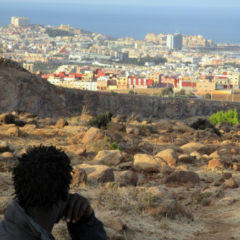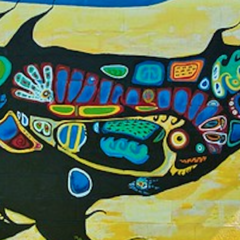Futurisms in Contemporary Turkey
4 July 2022, 6pm, The Keynes Library, 43 Gordon Square, Bloomsbury, London, WC1H 0PN Attendance is free, but booking is required. This talk will introduce scholarship on speculative fiction and futuristic narratives in Turkey and give a historical and literary survey of the tradition of entangled futurities and speculative worldbuilding in contemporary Turkish Literature. Discussion of the selected primary texts will illustrate the intellectual and academic interest in contemporary Turkey and the common concerns and themes portrayed in Turkish literature. Dr Emrah Atasoy is the author of the monograph Epistemological Warfare and Hope in Critical Dystopia (2021) and several articles and book chapters on speculative fiction, futuristic narratives, Turkish speculative fiction, ecocriticism, twentieth-century literature, and comparative literature. He is currently a visiting postdoctoral scholar at the Faculty of English, University of Oxford, as a recipient of the TUBITAK (The Scientific and Technological Research Council of Turkey) 2019 International Postdoctoral Research Fellowship Grant. Please click here to book your place. Featured image taken by Emrah Atasoy....
The Progressive Fantastic in Germany
Changing the Voices of Science Fiction: The Progressive Fantastic in Germany Wednesday 22 June 2022, 6-7.30pm, Birkbeck, University of London (attendance is free, but booking required) German science fiction has traditionally been a conservative genre, its main authors to this day mostly white, cis, hetero males of middle age. Until recently, diversity of genders, non-heteronormative sexuality, race or varied ethnic and cultural backgrounds, or representations of other marginalized groups (age, (dis)ability, etc.) has been sorely missing. But there has been a concerted effort by a younger, more diverse group of writers to change the approach to fantastic literature as a whole. Under the umbrella of the "progressive fantastic," they have called for the inclusion of other identities in speculative fiction, the strengthening of own-voices, and a keen-eyed reexamination of traditions and structures in fantastic texts. In this talk, I want to present the key features of this "progressive fantastic" by looking at exemplary texts of recent German SF production: Judith and Christian Vogts groundbreaking work in writing in a non-heteronormative language and presenting intersectionally diverse communities in Wasteland (2019) and Ace in Space (2020); James Sullivan’s investigation of belonging and self-positioning via Afrofuturist estrangement in Die Stadt der Symbionten (2019), Lena Richter’s subtle emphasis on (dis)abled and neurodivergent characters in her short stories "Feuer" (2020) and "3,78 Lifepoints" (2021), and Theresa Hannig’s reinvigoration of the hopeful narrative strategies of utopia as a genre in Pantopia (2022). Dr Lars Schmeink is currently Leverhulme Professor of German Studies at the University of Leeds, visiting from his position as Research Fellow at the Europa-Universität Flensburg, where he just applied for funding for a larger research project on science fiction as a form of science communication. Before coming to Leeds, he concluded his work as principal investigator of the federally funded "Science Fiction" subproject for the "FutureWork" network, an interdisciplinary research group working on the development of work and society. In 2010, he inaugurated the first German academic organization dealing with research into the fantastic, the Gesellschaft für Fantastikforschung, and served as its president for ten years. He is the author of Biopunk Dystopias (2016), and the co-editor of Cyberpunk and Visual Culture (2018), The Routledge Companion to Cyberpunk Culture (2020), Fifty Key Figures in Cyberpunk Culture (2022) and New Perspectives on Contemporary German Science Fiction (2022). Click here to book your free place. CLICK HERE TO LISTEN TO A RECORDING OF THE LECTURE. Featured image by BroneArtUlm under a CC BY...
Writers Rebel on hope and climate activism
Thursday 19 May 2022, 7.30pm, 43 Gordon Square Join us for this special event as part of Birkbeck Arts Week 2022 (free to attend, booking required). Writers Rebel was formed in late 2019 by a group of writers who felt they could no longer ignore the Climate and Ecological Emergency, but had to make it central to their writing and their political lives. Writers Rebel, as part of Extinction Rebellion, has since then drawn national attention to the climate disinformation spread by lobbyists based on Tufton Street. Many fellow authors, including Zadie Smith, Ben Okri and Margaret Atwood, have joined the campaign. For this event, Birkbeck welcomes three of these writers – Chloe Aridjis, Monique Roffey and Toby Litt – to talk about writing, hope, activism and climate. Monique Roffey is an award winning Trinidadian born British writer of novels, essays, literary journalism and a memoir. Her most recent novel, The Mermaid of Black Conch, (Peepal Tree Press) won the Costa Book of the Year Award, 2020, and was nominated for eight major awards. The film rights were sold to Dorothy Street Pictures and will be developed by Film Four. Her other Caribbean novels, The White Woman on the Green Bicycle and House of Ashes, have been nominated for major awards too (Costa, Orange, Encore etc). Archipelago won the OCM Bocas Award for Caribbean Literature in 2013. Her work has been translated into several languages. She is a co-founder of Writers Rebel within Extinction Rebellion. She is a Senior Lecturer at Manchester Metropolitan University and a tutor for the National Writers Centre. Chloe Aridjis is the author of three novels, Book of Clouds, which won the Prix du Premier Roman Etranger in France, Asunder, set in London's National Gallery, and Sea Monsters, which was awarded the 2020 PEN/Faulkner Award for Fiction. Chloe has written for various art journals and was guest curator of the Leonora Carrington exhibition at Tate Liverpool. She was awarded a Guggenheim Fellowship in 2014 and the Eccles Centre & Hay Festival Writers Award for 2020. Chloe is a member of Writers Rebel, a group of writers who focus on addressing the climate emergency and biodiversity loss. A collection of her essays and short fiction, Dialogue with a Somnambulist: Stories, Essays and a Portrait Gallery, was published last autumn. Toby Litt has published novels, short story collections and comics. His most recent book is Patience, a novel. He runs the Creative Writing MFA at Birkbeck College, and blogs at www.tobylitt.com. He is a member of English Pen and the editor of the Writers Rebel website. He is currently publishing his next book, A Writer’s Diary, in daily...
Refugee-Led Filmmaking
"Fifth Cinema": Theorising Refugee-Led Filmmaking, with Raminder Kaur and Mariagiulia Grassilli When: 15 October 2021, 18:00 — 21:00 BST Venue: Online (please book your place here) CCL member Dr Agnes Woolley will be hosting a screening of Les Sauteurs [Those Who Jump] (2016), directed by Abou Bakar Sidibé, Moritz Siebert and Estephan Wagner, followed by discussion with Raminder Kaur and Mariagiulia Grassilli on 15 October 2021. Raminder Kaur and Mariagiulia Gassilli describe ‘Fifth Cinema’ as: ‘a mobile, unstable, instantaneous, fragmented, displaced and hybrid bricolage. A “smart cinema”, owing to the prevalence of digital technologies, it exists in dispersed pockets. It is the expression of new creative modes’. In this discussion, we will unpack the idea of Fifth Cinema in relation to recent refugee filmmaking, asking what conceptual frames help us think through image making in the context of statelessness. We will explore the production contexts for these films and consider their role in resisting punitive bordering practices. Raminder Kaur is professor of Anthropology and Cultural Studies in the School of Global Studies at the University of Sussex. She is the author of Kudankulam: The Story of an Indo-Russian Nuclear Power Plant (2020); Atomic Mumbai: Living with the Radiance of a Thousand Suns (2013); and Performative Politics and the Cultures of Hinduism (2003/5). She is also co-author of Adventure Comics and Youth Cultures in India (with Saif Eqbal, 2018), Diaspora and Hybridity (with Virinder Kalra and John Hutnyk, 2005); and co-editor of several other books. Aside from her academic writing, she is a scriptwriter, theatre producer and filmmaker. Mariagiulia Grassilli is Research Associate at the School of Global Studies, University of Sussex and Director of Human Rights Nights in Italy. She works as a professional in Cinema and Human Rights, curating festivals and film production for raising awareness, creating empowerment and capacity building in Europe and Africa. Founding member of Human Rights Film Network – an international network of more than 40 human rights festival in the world. Her research focuses on migration, cinema, representations of diversity, cultural participation. Her publications include writings on Anthropology and Cinema (Journal of Visual Anthropology, vol. 20, 2007), Migrant Cinema (Journal of Ethnic and Migration Studies, vol. 34, 2009) and Human Rights Film Festivals (Film Festival Yearbook 4, St Andrews University, 2012). This is an online event: the link to the live discussion will be sent out on the day, and the film – Les Sauteurs (Abou Bakar Sidibé, Moritz Siebert and Estephan Wagner, 2016) – will be made available on the BIMI Screening Room for 24 hours before the event. Please book your place...
Indigenous Futurisms Keynote
We were really thrilled to be able to host "Activism & Resistance," the 5th annual conference of the London Science Fiction Research Community (LSFRC), which ran from 9-11 September 2021. Prof. Grace Dillon (Portland State University) delivered a wonderful keynote on the subject of “Moozhig-aendum-itchigaewin: Indigenous Futurisms and Climate Justice.” You can watch Grace's inspiring keynote below, which was chaired by Birkbeck's very own Dr Katie Stone (Research Associate, Department of English, Theatre & Creative Writing, Birkbeck). The talk considers how indigenous science fictions can help us decolonise the geological period known as the Anthropocene, by drawing on a rich set of indigenous practices that advocate dignity and humility in not giving up in the face of more than 500 years of colonial violence. Speaker bios: Grace L. Dillon is an American academic and author. She is an Anishinaabe Professor in the Indigenous Nations Studies Program, in the School of Gender, Race, and Nations, at Portland State University. Similar to the concept of Afrofuturism, Dillon is best known for coining the term Indigenous Futurism, which is a movement consisting of art, literature and other forms of media which express Indigenous perspectives of the past, present and future in the context of science fiction and related sub-genres. Dillon is the editor of Walking the Clouds: An Anthology of Indigenous Science Fiction, which is the first anthology of Indigenous science fiction short stories, published by the University of Arizona Press in 2012. The anthology includes works from Gerald Vizenor, Leslie Marmon Silko, Sherman Alexie, William Sanders and Stephen Graham Jones. Previously, Dillon has edited Hive of Dreams: Contemporary Science Fiction from the Pacific Northwest, which was published in 2003 by Oregon State University Press. Dr Katie Stone is Research Associate in the School of Arts at Birkbeck, University of London. Katie's PhD, titled "Children are the Future: Utopianism and Childhood in Science Fiction and its Criticism," was successfully completed in Spring 2021. Her most recent publication, "Hungry for Utopia: An Antiwork Reading of Bram Stoker's Dracula," was published in the journal Utopian Studies in 2021. Image by Ted McGrath under a CC BY-NC-SA...






Recent Comments